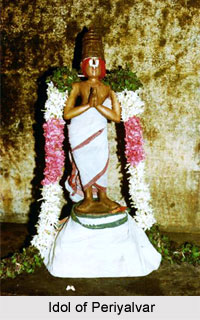 Periyalvar or Periyalwar, also known as Periazhwar, was a 6th century AD- 7th century AD poet saint and amongst the first of the 12 Alvar saints of South India, who are renowned for their association to Vaishnava tradition of Hinduism. The temples that were worshipped by these Alvar saints were known as Divya Desam. Periyalvar is credited with the composition of the devotional literary work known as Tirupallandu. He was a follower of the Vaishnava Bhakti philosophy.
Periyalvar or Periyalwar, also known as Periazhwar, was a 6th century AD- 7th century AD poet saint and amongst the first of the 12 Alvar saints of South India, who are renowned for their association to Vaishnava tradition of Hinduism. The temples that were worshipped by these Alvar saints were known as Divya Desam. Periyalvar is credited with the composition of the devotional literary work known as Tirupallandu. He was a follower of the Vaishnava Bhakti philosophy.
Early Life of Periyalvar
Periyalvar was born in the 6th century CE or 9th century CE, in Srivilliputhur, near Madurai, into a Brahmin family. He was born as Vishnuchittar, which means one who has Vishnu in his mind. According to legends, Periyalvar discarded the Vedic philosophical arguments of his upbringing to concentrate on Bhakti, particularly on conducting simple tasks in the name of God. He also used to make of flowers for the temple deities. In a competition of philosophical principles between scholars organized by the Pandyan king, Periyalvar explained that the way to attain to Moksha or salvation is through service to God. He won the competition and the king honoured him. According to legend, God himself came down to earth to witness this.
Periyalvar was enthralled by the childhood tales of Lord Krishna, an incarnation of Lord Vishnu. He developed love and devotion for God, in the form of Lord Krishna. He sang devotional hymns filled with maternal love, praising the child deity Krishna. Periyalvar was more focused and concerned regarding the wellbeing of child Krishna than his own self. Vishnuchittar, as he was earlier known as, was named as Periyalvar, the great Alvar saint because of his devotion and love to Lord Krishna.
Compositions of Periyalvar
Periyalvar, known as Vishnuchittar at the time, further composed a verse called Pallandu, also known as Thirup Palandu, meaning out of respect. The couplet is considered as one of the most significant prayers in Srivaishnava liturgy at present. He also composed a number of Pasurams in the 4000 Divya Prabhandham known as Perialvar Tirumozhi. There Periyalvar explores the love and devotion for God of a devotee through the metaphor of Yashoda`s motherly love for Lord Krishna. Little Krishna`s birthday celebrations are narrated in ten verses. Another ten verses describes the invitation to neighbours to enjoy child to enjoy physical beauty by elaborately explaining his navel, toes, thighs, chest, stomach, shoulders, neck, hands, mouth, eye-brows, eyes, ear-rings, hair and forehead.
The ten verses composed by Periyalvar, beginning with Manikkam Katti, are amongst the earliest extant cradle songs in Tamil literature. Some of the hymns eulogize child Krishna`s capability as a flutist, shepherdesses` love for him and Yashoda`s unwillingness to breast-feed the divine child after viewing his miracles. The devotional poems of Periyalvar that were composed during the 8th Century AD are the oldest Indian literature that depicts the incarnation of Krishna with devotion and love.
Periyalvar travelled to several temples through out Tamil Nadu, singing praises of Lord Krishna and expressing his devotion to God. Among the temples he revered, the most renowned are Srivilliputhur, Sri Ranganathaswamy Temple, Thirukoshtiyur, Azhagar Kovil, Tiruvellarai and Srirangam. Periyalvar was the adopted father of the only woman Alvar popularly known as Antal or Kodhai.













